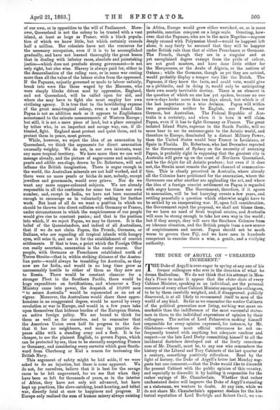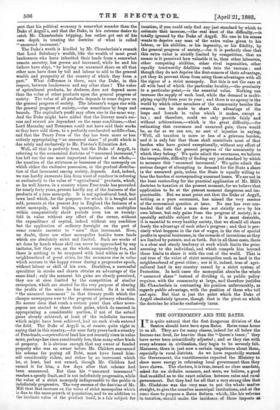THE DUKE OF ARGYLL ON "UNEARNED INCREMENT." T HE Duke of
Argyll is over-eager to spring at any one of his former colleagues who errs in the direction of what he deems Radicalism. We do not think that his attempt in Monday's Times to make it appear that the obiter dicta of every Cabinet Minister, speaking as an individual, are the personal concerns of every other Cabinet Minister amongst his colleagues, to be by them carefully weighed, and, if disapproved, publicly disavowed, is at all likely to recommend itself to men of the world of any kind. So far as we remember the earlier Cabinets of the political generation now living, nothing was more remarkable than the indifference of the most successful statesmen in them to the individual expressions of opinion by their colleagues. The notion of Lord Palmerston making himself responsible for every opinion expressed, for instance, by Mr. Gladstone—whose most official utterances he not unfrequently treated with anything but adequate candour and respect—or the late Lord Derby committing himself to all the incidental doctrines developed out of the lively consciousness of Mr. Disraeli, must be, to any one who remembers the history of the Liberal and Tory Cabinets of the last quarter of a century, something positively ridiculous. Read by the light of history, the Duke of Argyll's letter last Monday Enggests but one comment,—that the Duke would like to discredit the present Cabinet with the public opinion of this country, and especially to discredit it by holding it responsible for the rasher sayings of Mr. Chamberlain. Whether that rather unchastened desire will improve the Duke of Argyll's standing as a statesman, we venture to doubt. At any rate, while we do not share Mr. Chamberlain's apparent disdain for the historical reputation of Lord Burleigh and Robert Cecil, we sue
pest that his political economy is somewhat sounder than the Duke of Argyll's, and that the Duke, in his extreme desire to catch Mr. Chamberlain tripping, has rather got out of his own depth in treating the doctrine of -what is called " unearned increment."
The Duke's wrath is kindled by Mr. Chamberlain's remark that Lord Salisbury's wealth, like the wealth of most great landowners who have inherited their lands from a somewhat remote ancestry, has grown and increased, while he and his fathers have slept, " by levying an unearned share on all that other men have done by toil and labour to add to the general
wealth and prosperity of the country of which they form a part." What difference is there, says the Duke, in this respect, between landowners and any other class ? The value of agricultural products, he declares, does not depend more than the value of other products upon the general progress of society. The value of all products depends in some degree on the general progress of society. The labourer's wages rise with the general progress of society,—rise sometimes by leaps and bounds. The capitalist's profit may often rise in the same way. And the Duke might have added that the literary man's success and reward are dependent on the same conditions,—that Lord Macaulay and Tennyson could not have sold their works as they have sold them, to a perfectly uneducated middle-class, and that the Penny Press of the day has been more or less actively appropriating " an unearned share " of profit which is due solely and exclusively to Mr. Forster's Education Act.
Well, all that is perfectly true, but the Duke of Argyll, in referring to the economical doctrine of " unearned increment," has left out the one most important feature of the whole,— the question of the strictness or looseness of the monopoly on• which either the exclusive possession, or the gradual distribution of that increment among society, depends. And, indeed, we can hardly exonerate him from want of candour in referring so exclusively to the value of " agricultural " products, which, as he well knows, in a country where Free-trade has prevailed for nearly forty years, present hardly any of the features of the products of a true monopoly. It is not agricultural land, but town land which, for the purposes for which it is bought and sold, presents at the present day in England the features of a strict monopoly, and triples, quantuples, often multiplies within comparatively short periods even ten or twentyfold in value without any effort of the owner, without the expenditure of capital, indeed without any condition but the application of ordinary foresight on the part of some remote ancestor to " earn" that increment. Now, no -doubt, there are other monopolies besides town lands which are absolutely strict and limited. Such are works of art done by hands whose skill can never be approached by anyimitator, but they are, on the whole, comparatively few, and there is nothing to be compared with land within or in the neighbourhood of great cities, for the enormous rise in value which accrues to the happy owner daring a progressive epoch, without labour or skill of his own. Doubtless, a successful speculator in stocks and shares obtains an advantage of the same kind ; only the moment his gains are clearly perceived, they are at once limited by the competition of similar enterprises, which are started for the very purpose of sharing the profits of the mine he has discovered. So it is with "the unearned increment " in that literary profit which the cheaper newspapers owe to the progress of primary education. No sooner does that reach a certain point than other newspapers are started to share their gains, which do succeed in appropriating a considerable portion, if not of the actual gains already achieved, at least of the indefinite increase which might have been achieved, had no such rivals entered the field. The Duke of Argyll is, of course, quite right in saying that in this country,—for near forty years back a country of Free-trade,—agricultural land has not recently risen in value more, perhaps has risen considerably less, than many other kinds of property. It is obvious enough that any owner of funded property who was an owner before Mr. Childers announced his . scheme for paying off Debt, must have found himself considerably richer, and richer by an increment which he, at least, had not earned, though Mr. Childers had earned it for him, a few days after that scheme had been announced. But then his "unearned increment" reaches a speedy limit, and is not indefinitely progressive, while the value of a strict monopoly indispensable to the public is indefinitely progressive. The very essence of the doctrine of Mr. Mill that that increase on the value of strict monopolies which Is due to the mere growth of population, and to no addition to the intrinsic value of the product itself, is a fair subject for taxation, if you could only find any just standard by which to estimate that increase,—the real knot of the difficulty,—is totally ignored by the Duke of Argyll. No one in his senses wants to deprive any man of the extra value given to his labour, or his abilities, or his ingenuity, or his fidelity, by the general progress of society,—for it is perfectly clear that this extra value is strictly limited by competition, that no sooner is it perceived how valuable it is, than other labourers, other competing abilities, other rival ingenuities, other equally trustworthy fidelities rush into the vacuum ; and though they do not deprive the first-comers of their advantage, yet they do prevent them from using those advantages with all the rigour of a strict monopoly. But this is not the case at all with land of which the particular locality,—the proximity to a particular point,—is the essential value. Nothing can increase the supply of such land, while the demand is multiplying rapidly from year to year ; and there is no agency in the world by which other members of the community besides the owners, can be made to • share the advantage of the leaps and bounds in value which it makes, except a tax ; and therefore, could we only provide fairly and without arbitrariness,—which is the great •difficulty,—for estimating that enormous and unearned gain, there would be, so far as we can see, no sort of injustice in saying, Well, all taxation is more or less of a grievous burden, and it is only fair that those shall contribute most of that burden whohave gained exceptionally, without any effort of their own, from the general progress of the community to which they belong.' We quite admit the enormous, we believe the insuperable, difficulty of finding any just standard by which to measure this ' unearned increment.' We quite admit the serious danger of attempting to demand for the State a share in the unearned gain, unless the State is equally willing to bear the burden of corresponding unearned losses. We are not in the least contending for the practical application of Mr. Mill's doctrine to taxation at the present moment, for we believe that application to be at the present moment dangerous and impracticable. But we mast point out that the Duke of Argyll, writing as a pure economist, has missed the very essence of the economical question at issue. No one has ever contended that all that a man does not strictly earn by his own labour, but only gains from the progress of society, is a specially suitable subject for a tax. It is most desirable, it is essential to every healthy society, that we should all share freely the advantage of each other's progress ; and that is precisely what happens in the rise of wages, in the rise -of special profits in special businesses, in the rewards of inventions as they are limited by patents, and so forth. But in all.these cases, there is a clear and _steady tendency at work which limits the prize accruing to the individual, and which compels him beyond those limits to share it with the rest of the world. That is not true of the value of strict monopolies such as land in the neighbourhood of great cities ; nor is it, indeed, true of agricultural land in any country cursed by a strict system of Protection. In both cases the monopolist absorbs the whole "unearned share " instead of dividing it, as public policy requires, with the community at large, and therefore justifies Mr. Chamberlain in contrasting his position unfavourably, as regards public advantage, with the position of those who toil and spin. But that is just the point which the Duke of Argyll absolutely ignores, though that is the pivot .on which the doctrine he attacks exclusively turns.



































 Previous page
Previous page